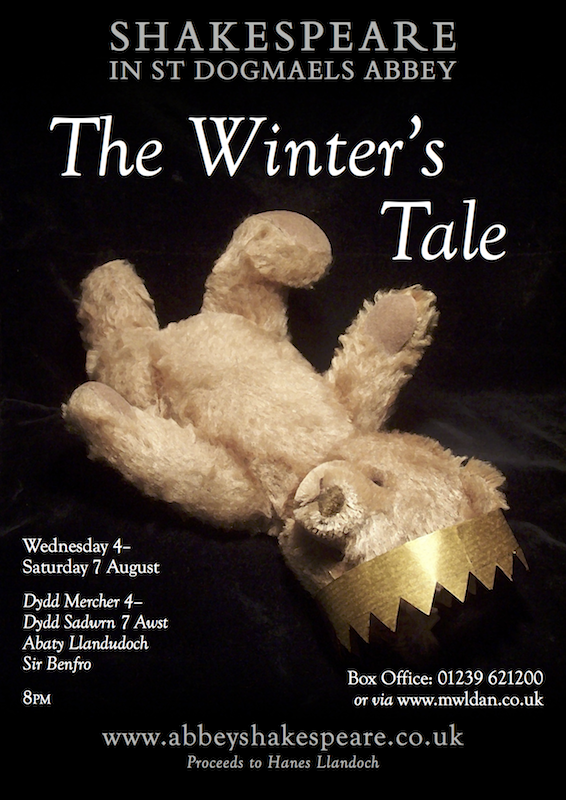Exit, pursued by a bear
— Stage direction, Act III Sc 3A sad tale's best for winter: I have one
Of sprites and goblins.
— Mamillius, Act II Sc 1
A friend suspected, a wife rejected, two children lost: King Leontes seems to have destroyed everything he loves through jealousy. But redemption awaits through the constancy of women and the simple goodness of a country shepherd and his son.
From the rigid codes of the Sicilian court to the bucolic joy of Bohemia, sunshine and shadow chase one another across the stage in Shakespeare's best-loved late romance.
I would there were no age between sixteen and three-and-twenty, or that youth would sleep out the rest; for there is nothing in the between but getting wenches with child, wronging the ancientry, stealing, fighting – Hark you now!
— Old Shepherd, Act III Sc 3
Director's note
The Winter's Tale is a play of two halves! It opens in the grey, claustrophobic Sicilia and leaps to the festive wilds of Bohemia. It is a study of the human mind, of its capacity for destruction and creativity. It is an itinerant play which expresses what it is to travel and to look back.
I have always loved it as it encompasses the fear and thrill of life – and in this tale, you get a second chance. It is farcical, brilliant and humane and remains one of Shakespeare's greatest works.
Oh, and the only one with a bear.
Music notes
When daffodils begin to peer,
With heigh! the doxy over the dale
Live music-making looms large at St Dogmaels, where a typical year brings together players and singers of all ages, backgrounds and abilities - from those who have never performed in their lives to members of national companies and orchestras.
Richard Morris - who has composed music for the Abbey Shakespeare Players for many years - conjured two contrasting sound-worlds for The Winter's Tale.
Sicilia is courtly and formal.
For Bohemia, life-enhancing central European folk song and dance traditions form the core.
Get you hence, for I must go
Where it fits not you to know.
Whither?
O, whither?
Whither?
It becomes thy oath full well,
Thou to me thy secrets tell.
Me too, let me go thither.
Or thou goest to the orange or mill.
If to either, thou dost ill.
Neither.
What, neither?
Neither.
Thou hast sworn my love to be.
Thou hast sworn it more to me:
Then whither goest? say, whither?
Cast
| Time | Linda Kirk |
Sicilia
| Leontes, King of Sicilia | Joseph Kao |
| Hermione, his wife | Heledd Hart |
| Mamillius, his son | Annie Sheen |
| Perdita, his daughter | Annie Sheen |
| Camillo | Ian Wood |
| Antigonus | Andrew Frank |
| Cleomenes | Ann Shepherd |
| Dion | Tony Shepherd |
| Paulina | Jane Morris |
| Emilia | Ann Christys |
| Gaoler | Mike Hall |
| Mariner | Tim Chadwick |
| Lords | Tom Bailey, Tim Chadwick, Ed Long, Will Long, Henry Morris |
| Ladies | Angharad Evans, Georgina Ferry |
| Children | Kyra Cundy, Bethan & William Eyon, Isaac, Leo & Jethro Harrison, Emily Jenkins, Hermione Miltiadou |
Bohemia
| Polixenes, King of Bohemia | Ed Hancock |
| Florizel, his son | Ed Long |
| Autolycus, a rogue | Richard Mitchley |
| Old shepherd | Richard Carwardine |
| Clown, his son | Will Long |
| Mopsa | Emma Hall |
| Dorcas | Angharad Evans |
| Servant | Henry Morris |
Crew
| Director | Abbey Wright |
| Composer & Musical Directors | Richard Morris, Henry Ward |
| Lighting Designer & Technical Director | David Long |
| Technical Assistant | Andy Reader |
| Wardrobe | Stephanie Ross, Jane Kipling |
| Props | Penny Miltiadou |
| Poster & Website Design | Ed Long |
| Front of House | Jane Hall, Sue Jones, Penny Miltiadou, Janet Paynter, Susana Hanson |
| Set | Robert Fitzmartin & Henry VIII |
Musicians
| Oboe/Oboe d'amore/Oboe da caccia | Simon Denison |
| Clarinet | Ann Macleod |
| Trumpet/Guitar | Dan Webster |
| Recorder | Ann Christys |
| Keyboards | Henry Ward |
| Viola | Bea Munby |
| Violoncello | Bob Dent |
| Percussion | Ann Christys, Dan Webster, Bea Munby, Ed Long |
